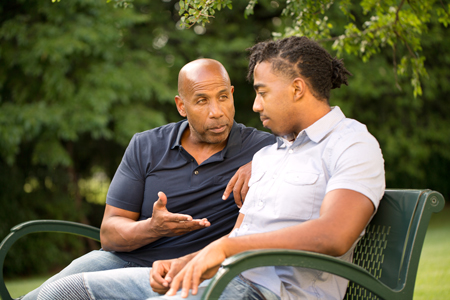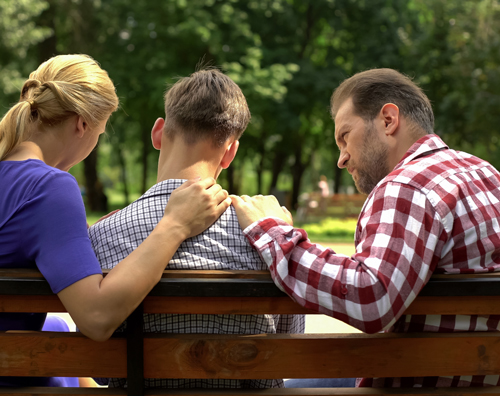My Child is an Addict: A How-To Guide For Parents
As addictive behaviors control the actions of the one we love, frustration and resentment are born of uncertainty. Unsure of what to do or how to help can render the parents of addicts confused and alone. Conflict and shame often drive a wedge between the parent-child relationship, resulting in hopelessness and anger. These emotions are difficult to move past, and worsen during active addiction.
Discussing Addiction: The Right Way or The Wrong Way
Although many parents want to soothe the pain of their suffering child, addiction is a confusing illness. Unfortunately, in an attempt to take action, parents of addicts may unintentionally alienate their child, or worse, become their enablers. Because of this, parents of addicts should be educated on the facts of addiction. This includes what the disease does to the addict’s mind and body, and how to be proactive about treatment. Especially, with a relationship that is strained or damaged, the best approach is with well-informed concern and a rehab plan.
Parents of Addicts Ask: Why Did My Child Choose Addiction?
“What made my child choose to be an addict?” “How could they let this happen?” “Why can’t they just stop using?” “Where did I go wrong?” These are some of the most common questions asked by parents of addicts. But the truth is, it’s a touchy topic to provide an answer for.
In short, parents of addicts must understand that addiction is a disease, not a choice. It is classified as a psychological illness, and diagnosed as a substance use disorder. Just like any other disease, it affects the body as a whole, and comes with a slew of unpredictable symptoms. There are many possible circumstances that can drive addiction, despite what many parents of addicts may think.

Didn’t My Child Decide to Abuse Substances Before Addiction?
An individual that has chosen to experiment with substances, likely didn’t do so with the intention of triggering the disease. Experimenting with alcohol at a certain age is often considered a privilege, or right of passage. Despite being legal, studies show that developing alcoholism is a common risk, and can run in families. For some individuals, it doesn’t take much to become dependent, and many become addicts quickly. Yet, as the illness progresses, these substances change the individual on a fundamental level.
Interfering with brain chemistry is just the tip of the iceberg. Before long, addiction has power over the addicts behaviors, mood and actions. This is especially concerning to parents of addicts whose children are >young adult substance users.
Because the brain isn’t fully developed until the mid- to late 20s, permanent damage could be sustained. Parents of addicts should seriously consider getting their child treatment as soon as possible to avoid irreversible harm.
So, although initially testing the waters with addictive chemicals may have occurred by choice, developing into addiction surely was not. The disease of addiction requires treatment to manage, and should not be taken lightly. With the proper rehab intervention, parents of addicts can find reassurance knowing that their child can achieve recovery through sobriety.
Diagnosing and Classifying Addiction as An Illness
Addiction is a chronic disease in which many are prone to relapse, meaning there is no known definitive cure. However, in recent years, much more research keeps parents of addicts hopeful when facing this newly recognized disease. Through treatment and therapy research, efficiency and successful recovery outcomes are more and more prevalent.
Although evidence supports addiction to have been around throughout history, it only recently became acknowledged as the illness it is. The Diagnostic and Statistical Manual of Mental Disorders (DSM-5), was updated in 2013 by the American Psychiatric Association. This amendment was to include and label addiction in the DSM-5, to be diagnosed as a substance use disorder. Sub-categorized into three tiers, severe, moderate and mild, and then adjusted to include 4 complementing classifications:
- Pharmaceutical (prescription drug usage with potential for abuse)
- High-risk use
- Social use and impairment
- Altered and impaired control
While the need to professionally treat addiction has long been considered a necessity, standard classification promotes increased effectiveness and consistency. Several different types of therapy can be integrated into treatment immediately, and adjusted as individually needed. The sub-groups provide better means to communicate the progression of the disease, and also, more measured approaches to treat it.

Most Effective Treatment Methods for Addiction
Substance use disorders have no finite cure, unfortunately. However, the illness is very treatable with professional care. Parents of addicts, who are especially concerned about their child’s overall state of wellness, often opt for inpatient rehab programs. Although some parents of addicts may be apprehensive of a full-time rehab facility stay, it universally yields the best outcomes.
Upon arrival, the addicted individual can move swiftly through the program without outside distraction or temptation. Both counseling and recovery lessons will be part of the curriculum, as well as effective coping courses. Not only does this encourage participation and focus to be placed on necessary treatments, but also a sense of community. Surrounded by peers throughout their wellness and rehab journey, like-minded addicts will work toward a common goal together.
Parents of Addicts Concerned About Withdrawal
One mistake parents of addicts make is to suggest trying to privately attempt detox at home. When first enrolled in a rehab program, detox is the first milestone to achieve. Many parents of addicts think that they will be able to monitor the symptoms of withdrawal without professional assistance. However, detoxing at home is strongly cautioned against, and can be disturbing for those unprepared.
Withdrawal symptoms from addiction are unlike any other illnesses they have nursed their child through. Specifically, because of how quickly symptoms arise and increase in severity. Realistically, many withdrawal symptoms can be life-threatening when not overseen in a professional setting. In fact, often emergency medical personnel are called to administer aid to the detoxing addict at home anyway. Besides dangerous, it can just be downright terrifying.
Under the close supervision of medical professionals, certain comforts and medication assistance are readily available options. Because detoxing from an addiction is uncomfortable and sometimes unpredictable, an experienced detox facility is trained in these circumstances. The addict will be given a safe space to experience withdrawal and detox. This provides both the individual, and parents of an addict, peace-of-mind with the effective means to get clean.
Addressing Concerns About Co-Occurring Mental Illness
Addiction is a psychological illness that can be brought upon by a number of triggers. Typically, substance use disorders are either environmentally triggered, socially triggered, or psychologically triggered. Once dependency has developed, addiction is increasingly more likely to be associated with additional or underlying mental illnesses.
Environmental Influence on Children and Teen Addiction
There are many possible circumstances that can drive addiction, despite what many parents of addicts may think. This is what makes rehab a superior means to address addictive behavior. Proper diagnoses are often concluded after one-on-one evaluations and followed up during individual therapy. Young addicts are less likely to open up about unhealthy homes and insecurity, due to fear of judgment. In an attempt to protect their territory of an unstable living space, divulging this information requires privacy and feeling safe.
Working with a therapist at rehab, can help to overcome emotional, environmental, or physical insecurity. The feelings that stem from the lack of control over their own life and wellbeing, may be to blame. In an attempt to find relief from unwanted stress, turning to substances may have felt like the only way.
Sometimes, an illness like depression will be the driving force behind addiction. Sometimes there will be no overlapping conditions at all. For others, addiction may lead to changes in brain chemistry, resulting in a manic or depressive state. The correlation is not always standard, but addiction as a co-occurring disorder is not uncommon.
Parents of addicts should enlist the help of rehab therapists to diagnose concerning conditions that can affect treatment. By evaluating for psychological abnormalities, a dual diagnosis can be determined and treated alongside addiction. It is especially important to ensure that overall wellness is maintained during recovery to avoid an untreated illness-derived relapse.
Children and Teens with Genetic Predisposition of Addiction
It would be much more simple to understand if one specific event led children and teenagers to addiction. However, most often, it begins before you think it does. Each individual reacts differently toward environmental and emotional factors. Simply being exposed to addicts or substance abuse can be enough, although may not be solely responsible.
It is important for parents of addicts to make themselves aware of potential genetic links toward addiction. Studies reflect that addiction, especially alcoholism, can be passed down biologically. In fact, just slightly more than 50% of those with an addict in their immediate family have succumbed to the illness. Yet that still leaves roughly over 40% of those with no genetic interference. While assuming that addiction was derived through family predisposition can be helpful during assessment, there could be more to it.

Trauma and Psychological Illness Persuading Substance Abuse
Developing an addiction as a means to self-medicate is typically reported after the experience of trauma. Trauma is the number one experience that leads to abusing addictive substances. Simply becoming aware of a devastating event or loss can be enough to trigger psychological illness. Thus, leaving behind unwanted feelings that are too much to bear.
Although illicit drugs or alcohol are assumptions that parents of addicts consider likely culprits, medication misuse is far more likely. Those that are underage or without freedom of transportation may resort to what is more readily available to them.
For example, the medicine cabinet may be a reliable source where parents of addicts store their forgotten and unused prescriptions. Another source of abuse is by taking an inappropriate dose of amphetamines, prescribed to treat ADHD. Even more common is the abuse of anti-anxiety drugs. These prescription medications quickly lead to dependency and addiction and should be closely monitored by a responsible guardian.
Identifying Addiction: For The Use of Parents of Addicts
It is overwhelmingly important for parents of addicts to be able to identify the warning signs of addiction. Even after treatment, being on the lookout for potential relapse can save your child’s life. Stay alert for red flags that could suggest an active addiction or an impending relapse. Some of the most common identifiers include:
- Declining school performance
- Lack of motivation or interest
- Poor hygiene or self-neglect
- Inability to maintain eye contact or intentional distancing
- Secretive or withdrawn behaviors
- Odors of smoke, alcohol or tobacco
- Irregular sleeping and eating
- Lying, cheating, stealing
- Missing designated curfew, trouble in school or with the law
- Mood swings, anger or outbursts
- Paranoia, depression, mania or anxiety
- Rapid or incoherent speaking
- Inability to maintain focus or inability to concentrate
It can be tricky for parents of addicts to differentiate between what is considered normal teenage behavior, and addiction tendencies. This is why close observation and communication is essential. Although a dramatic change should be closely examined, sometimes this is typical individual development. If communication is lacking between the child and parent, family therapy will be beneficial to open lines of contact. Don’t wait to have the hard talks, your child’s life may depend on it. However, if no means are available, more extreme measures may be necessary.

How To Talk To Your Kids About Addiction
In order to communicate effectively with young adults or teens, it will be important to attempt to level with them. No doubt as adults we can look back and remember the pressures and uncertainty when coming of age. However, if those days have long passed, and it is difficult to empathize, hope a relationship is not lost. Before interacting with your child, parents of addicts should keep two important factors in mind
What you think of them matters.
One important thing to remember about your teen is that much of the time their security is built on confidence. Parents of addicts must remember that self-image and personal acceptance for teens is based largely on the opinion of others. In an effort to “fit-in” behaviors and moods can reflect insecurity or uncertainty. This is especially true when addressing young women, who tend to experience more stress during development.
Parents of addicts approaching their young adult children should be open and accepting, opposed to judgemental. Listen and converse calmly, taking in information patiently. This does not mean making the conversation one-sided, but more so a respectful back and forth, flowing appropriately.
Your child is growing up and becoming an independent individual.
Another perspective for parents of addicts to consider is that their child is discovering their own independence. This time in their lives is when they will figure out what they are capable of, and begin setting boundaries. Be mindful of this, while maintaining control over uncomfortable situations.
Staying calm and receptive is essential, instead of jumping to immediate conclusions. Being treated like a child is what every child hates. Try keeping your tone and volume steady, especially when expressing your own thoughts about their behaviors, keeping accusation at minimum.
There’s a Time and a Place to Have Important Discussions
Like everything, there is an appropriate time and place, so choose a good one. Parents of addicts should carve out the time among their busy schedules, to provide adequate attention. That means running out the door or when late for a meeting might not be the best times. Go for dinner, cook at home and sit down together, or even just go walk the dog together. It doesn’t have to be a big production to spend quality time, it just has to be a comfortable interaction.
An ambush in public among strangers, or worse, in front of their peers, will almost always end in disaster. Talking about any major concern, such as emotional wellness, relationships, or addiction, might be inherently uncomfortable, but very necessary. Fortunately, in the right setting, even the most awkward topics can be properly discussed.
Parents of Addicts Help By Being Supportive
Remember to stay supportive, no matter what personal information they chose to share with you. Remember, you are the parent, you have their best interest at heart. That notion should extend beyond right and wrong, but into respect and consideration as well. Especially when hearing any details that you may not like to hear, stay calm and prove that you can listen.
After hearing them out, try to make appropriate decisions for their health and wellbeing together. This way, it becomes less of a demand, and more of a mutual agreement to get treatment. When addressing addiction concerns with them privately, or when planning an intervention, the more that parents of addicts know matters.
Important Conversations For Parents of Addicts and How To Conduct Them
Parents of addicts must consider that it’s equally important to know how to speak, as is what you speak about. Do your best to phrase questions away from simple one-word answers. A mere yes or no response could end in the dismissal of a topic, that should be otherwise revisited. Try to phrase statements into a format suggesting that you could be of aid regarding any issue or concern.
For example, parents of addicts could say, “When you are open with me, I can help you, or make this easier for you.” Likewise, when responding, use phrases such as “I feel like…” or “ I become worried when…” This acknowledges that you have intently listened and appreciated what has been said, while expressing your reaction clearly. Most importantly, avoid long speeches and single-sided preaching. The interaction is meant to be an exchange, not a debate.

Providing Help and Support Instead of Punishment
For the addict, discussing addiction is a very vulnerable topic. Sometimes, the interaction takes a turn, and anger or aggressive speech is tempting. This is true for both parties. Instead of letting negative emotions get the best of you, remember why you’re here.
Stay in the mindset that the priority is to provide your child with love and support, instead of judgement and shame. This will make it easier to convey your message, and discuss the potential harm addiction can cause. Besides, most of the time the addict already knows what they are doing is dangerous and usually illegal. Keep the talk relevant, and address specific concerns that can impact their health and future. Clearly explain why getting help is the best way to overcome addiction, and can give them back control.
If it was easy, you probably wouldn’t be reading this for advice. But hang in there. The hardest discussions are often the most necessary. And, even though it may be a natural reaction to punish and scold, it will usually do more harm. Those reactions are just a bandaid, and realistically only serve to “win” or assert dominance, not respect.
Essential (But Difficult) Conversations Worth Having
Getting to know your young adult child is important to making sure they are growing into healthy adults. Parents should be prepared and informed to have several of the following topics, and establish open communication.
- Family history of addiction
- Family members with ongoing active addiction
- Mental illness, emotional wellbeing, and self-care
- Physical health concerns
- Relationships, both personal and sexual
- Decision making, morals, and values
- Peer pressure, academic standing, and self-respect
- Substance use, especially alcohol use (and moderation if of an appropriate age)
- Gender identification, sexual orientation, and setting personal boundaries
- Concern or inquiry into substance use, abuse, or addiction
A healthy parent-child relationship consists of discussing important information with them when age appropriate. Avoiding certain topics can quickly lead to insecurity and inadequacy, furthering the risk of unhealthy coping. Parents of addicts who maintain communication, lessen the risk of turning to substance abuse, instead of parental support.
Parents of Addicts Make a Difference In Recovery
Having a solid and dependable support system will make a difference. The future of any child or teen with an addiction is not a hopeless ending. The one you love is still in there, despite addiction being in control.
If you suspect your child is suffering from an addiction, get started planning a rehab curriculum. Try having the conversation. Reach out to professionals for help. Explain why getting sober is important, and remind them of what they have to lose. Being a parent of an addict is often a thankless job, but recovery is something to be grateful for.
References:
- https://www.drugabuse.gov/publications/media-guide/science-drug-use-addiction-basics
- http://headsup.scholastic.com/students/the-role-of-genes-in-drug-addiction
- https://www.ncbi.nlm.nih.gov/pmc/articles/PMC2827693/
- https://www.ncbi.nlm.nih.gov/pmc/articles/PMC2715956/
- https://imprintnews.org/child-trauma-2/when-trauma-slips-into-addiction/32462
Take the Next Step
The path to recovery is only one step away. Begin your treatment at CNV Detox in Los Angeles, California as soon as the same day. For your convenience, we work 24/7. Our team is ready to help as soon as you reach out.
